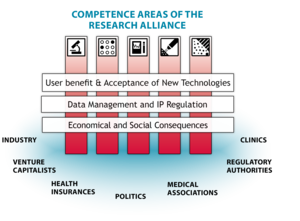LEIBNIZ HEALTH TECHNOLOGIES
The member institutes and industry partners of Leibniz Health Technologies are working on concrete technology solutions for pressing medical issues. Together they follow the goal of improving medical care for patients. Through the cross-disciplinary approach, diagnosis, therapy and monitoring converge to increase the quality of life.
The Leibniz research alliance unites competencies from very different scientific fields: from photonics and medicine to microelectronics and materials research to economic research and applied mathematics. This results in health technologies that together with industry, hospitals, insurance, and politics are led to marketability along a complete innovation chain. Simultaneously, Leibniz Health Technologies conducts research on the social and economic impact of new medical technologies to optimize their applicability for users and create wide social acceptance of new technologies.
Challenge
Vision
Strategy
Networking
To actively promote interdisciplinary networking between the members of Leibniz Health Technologies, the Leibniz Research Alliance offers three internal funding instruments:
- Short Term Scientific Mission (STSM)
This funding instrument enables young scientists to spend a limited period of time researching at one of the 16 Leibniz institutes or associated partners. During an STSM, new methods can be learned in cooperation with specialists and scientific work can be carried out that is not possible at one's own institution. - Conference Participation Initiative (CPI)
This funding instrument supports the participation of young scientists in leading conferences (or other scientific events) in order to promote networking with external medical technology researchers as well as with stakeholders in the health care system. - Funding for Feasibility Studies (FFS)
In order to promote the development of innovative health technology approaches and to critically evaluate the transfer potential of novel technologies, Leibniz Health Technologies provides start-up funding for feasibility studies within the network. The findings from these studies are to be incorporated into collaborative projects that build on them.
All three funding instruments pursue the goal of strengthening the exchange between the members of Leibniz Health Technologies, enabling efficient networking with external actors in the health sector and rapidly transferring innovative research approaches into translation-oriented collaborative projects.
